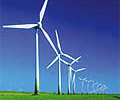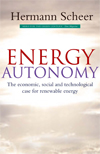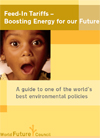 Address of Dr. Hermann Scheer, MP and General Chairman of the World Council for Renewable Energy, World Wind Energy Conference 2002, Berlin, July 2nd to 6th, 2002
Address of Dr. Hermann Scheer, MP and General Chairman of the World Council for Renewable Energy, World Wind Energy Conference 2002, Berlin, July 2nd to 6th, 2002I have the honour and the opportunity to welcome you to this World Wind Energy Conference. I do this in several capacities, as General Chairman of the World Council for Renewable Energy (WCRE) and as President of EUROSOLAR, the European Association for Renewable Energies – and as one of the architects and the rapporteur of the German Parliament for the Renewable Energy Act, the legal framework for the worldwide most successful policy promotion of Renewable Energies in the electric power sector. You are certainly familiar with the figure of 10.000 MW of wind capacity which we installed within ten years. However, due to the new law, alone in 2001 we had 2600 MW of new installations. This tendency continues. We are proud of that, but it is by far not enough. It is only the beginning. If we can continue this growth within the next decade, we will have more than 25.000 MW installed in 2010 – just by on-shore-capacities. With off-shore-capacities we could even go beyond 30.000 MW.
Many people, even within the wind energy scene, think that the space for new on-shore installations would be limited due to local resistances. However, from my experience it may just be the other way around: the more windmills are installed, the more people will recognise that a lot of existing prejudices against windmills are actually lacking substance and that many counterarguments are out of proportion or ridiculous, considering the global ecological crisis humankind is facing. An increasing number of people will accept them as an integral part of the landscape and will ask: why are there no windmills in my region? Moreover, the more windmills are installed, the further the structural change of the conventional electric power supplying structure will progress – caused by the replacement of large conventional power stations. The result will be a transformation of power line structures. We have for instance more than 200.000 high voltage masts in Germany. High voltage masts are a result of large conventional power stations. The more of these stations are replaced by windmills or other decentralised Renewable Energy Plants, the more high voltage masts will disappear – and the landscape will be released from it.
I am saying this because we need offensive action in support of the general acceleration of wind power. This includes a creative vision about the structural revolution of the energy sector caused by Renewable Energies. The time will come when there will exist combined electric power production of windmills and biomass plants or new electric power storing technologies. By then, the problem of discontinuity of wind will be solved, electric power can be supplied all day long and direct links between producers and customers will be established. The time will also come when windmills are used for grand strategies for water desalination and decentralised production of hydrogen for transport fuels. And – not to forget – the potential of small wind turbines in small villages in third world countries that don’t have a grid connection – wind home systems and PV/Wind village systems. This conference will not discuss only one kind of application of wind energy; the whole variety of applications makes this option more and more attractive. We are just at the beginning of a new age of energy technologies of Renewable Energy multi-utilities at the regional and local level. This is a one-in-a-lifetime chance for our environment; for new industries with many new job opportunities; for national economies that can avoid energy imports and destabilisation of their currencies; for overcoming national vulnerability and international conflicts on exhausted fossil energy.
Many people wonder why Renewable Energy has been so successful in Germany. The answer is an adequate policy framework, based on the guaranteed access of Renewable Energies to the grids and on legally guaranteed minimum reimbursements. 98% of the Renewable Energy installations were implemented by new and independent players and not by established utilities. These players do not have the problem of vested interests caused by own established conventional capacities that are automatically competing with investments on new Renewable Energy technologies.
However, there are some more preconditions for succeeding. Legal frameworks need applicants. The mobilisation of new players will succeed by stimulating public awareness on Renewable Energies. If the public becomes aware of the real opportunities of Renewable Energies and believes in their future, Parliaments, Governments and investors will support them. The best way to win the support of the public is to present an ambitious and optimistic perspective and to underline the strong performance of Renewable Energies. In democratic societies support for policies comes from the public.
We had a lot of conflicts implementing the Renewable Energy Act. The most important step to succeed was to carry out these conflicts. They were about the primary right of equal market principles and the primary right of saving the environment. The lesson learned is that the introduction of Renewable Energy will not succeed if a consensus is slowly build up, but by pushing this energy option politically and being prepared to carry out political, public and legal conflicts against many mental and structural barriers. An old Chinese saying states, “if the wind of change blows, some are building walls and others build windmills.”
This is not a new experience. Every new development is confronted with established interests that are defended as long as possible by its stakeholders who are unwilling to sense the wind of change. The decision to build new roads cannot be left to the representatives of the old ones. The frontrunners must act independently. If they succeed, the established interest will follow. That is the way of change.
Last but not least: the basic precondition of our success story was the solidarity and collaboration among all Renewable Energy associations and the creation of an alliance in society. In 1997 when the former liberal-conservative majority in the German Parliament intended to abolish our law, we organized a mass manifestation in front of the Parliament, supported by all Renewable Energy associations, the Environment League, the Farmers Association, the Association of Machine-Manufacturers and the labour union of the metal sector, which were aware of the fact that the windmill industry was about to become the strongest demander for steel in Germany.
It is an imperative to work together. Therefore, the present tensions within the Wind Energy sector must turn into history. I was asked in the last months to mediate among the conflicting parties. The outcome of these talks is that after the Global Wind Power Conference in Paris and the World Wind Energy Conference in July in Berlin, a common line of worldwide Wind Power Conferences should be started, and that all wind energy protagonists should be associated in one world organisation.
Renewable Energies as the Agenda No. 1 on the international Agenda with wind power as a frontrunner – this must become the priority.



